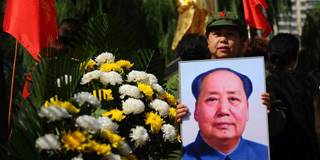Looming large in recent books about contemporary China is the sheer capaciousness of Maoism. What can an ideology that has come to mean so many things to so many people tell us about the political trajectory of the world's new superpower?
- Jude Blanchette, China’s New Red Guards: The Return of Radicalism and the Rebirth of Mao Zedong, Oxford University Press, 2019.
Julia Lovell, Maoism: A Global History, Bodley Head, 2019.
Andrew G. Walder, Agents of Disorder: Inside China’s Cultural Revolution, Belknap Press (Harvard University Press), 2019.
Yang Kuisong (translated and edited by Gregor Benton and Ye Zhen), Eight Outcasts: Social and Political Marginalization in China under Mao, University of California Press, 2019.
Jeffrey Wasserstrom, Vigil: Hong Kong on the Brink, Columbia Global Reports, 2020.
OXFORD – The story that the West has told itself about China over the past few decades is now unraveling. According to this narrative, China was radically ideological under Chairman Mao Zedong’s rule (1949-76), and then became largely an economic-development project in the decades following the madness of the Cultural Revolution (1966-76). China remained authoritarian, and stayed committed to the pursuit of great-power influence, of course; but it had shed the revolutionary fervor of the high-Maoist era for good.

Julia Lovell, Maoism: A Global History, Bodley Head, 2019.
Andrew G. Walder, Agents of Disorder: Inside China’s Cultural Revolution, Belknap Press (Harvard University Press), 2019.
Yang Kuisong (translated and edited by Gregor Benton and Ye Zhen), Eight Outcasts: Social and Political Marginalization in China under Mao, University of California Press, 2019.
Jeffrey Wasserstrom, Vigil: Hong Kong on the Brink, Columbia Global Reports, 2020.
OXFORD – The story that the West has told itself about China over the past few decades is now unraveling. According to this narrative, China was radically ideological under Chairman Mao Zedong’s rule (1949-76), and then became largely an economic-development project in the decades following the madness of the Cultural Revolution (1966-76). China remained authoritarian, and stayed committed to the pursuit of great-power influence, of course; but it had shed the revolutionary fervor of the high-Maoist era for good.